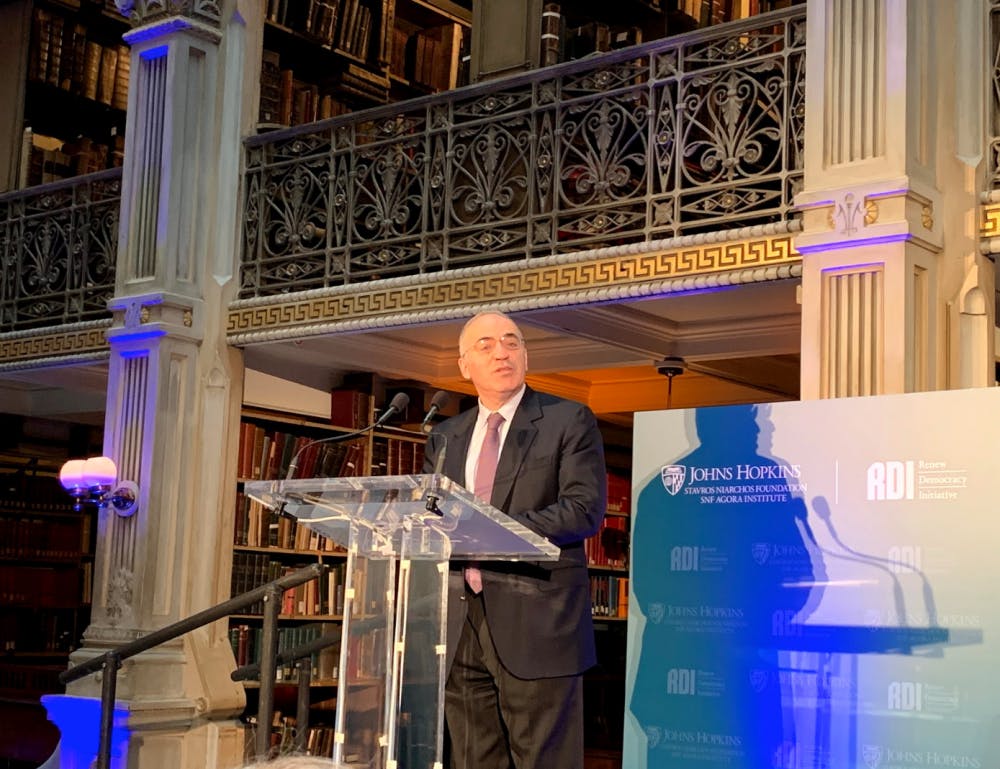The Renew Democracy Initiative and the Stavros Niarchos Foundation Agora Institute co-hosted Reawakening the Spirit of Democracy, a conference which aimed to analyze threats to liberal democracy and propose solutions.
The conference took place at the George Peabody Library and included panels on topics such as free speech, disinformation and populism. Panelists included think-tank journalists, such as Jennifer Rubin of The Washington Post and Peter Wehner of the New York Times, as well as politicians like Donna Brazile, former interim chair of the Democratic National Committee.
Garry Kasparov, chairman of the Renew Democracy Initiative and former world chess champion, opened the afternoon session with a speech on the state of liberal democracy around the world. Kasparov expressed a bleak viewpoint, asserting that it is under attack everywhere by many different forces.
“Authoritarian regimes like Russia and China have become more dictatorial at home and more aggressive abroad. Fragile republics like Hungary and Turkey have shifted to demagoguery and autocracy. Populists rule Italy, while fascists and socialists have made gains across much of Europe. Bulwarks of democracy like Germany, the United Kingdom and the United States are struggling with populism, xenophobia and the rise of ideological extremism on the right and the left,” he said.
Kasparov explained that he is most concerned about the loss of individual freedoms and rights in non-democratic countries. Further, he identified extreme partisanship as a particularly concerning threat to liberal democracy.
Kasparov said that his pessimism about the present state of liberal democracy reflects the traumas of his personal life. In 1990, he and his family were forced to flee from Baku, Azerbaijan, when violent anti-Armenian riots broke out in the city. To avoid persecution, he and his family moved to Russia. In 2013, however, fearing violent repercussions by Vladimir Putin for his political activism, Kasparov left Russia where, according to Kasparov, his fellow oppositionists were being harassed and murdered.
Kasparov warned that though violent political repression might seem like a remote possibility in the U.S., it could happen if the public fails to remain vigilant.
“Decay does not happen overnight. It does not begin with weak institutions or a corrupt executive. Those are the effects that reveal how weak the system has already become. It’s the result of years — even decades — of complacency, a shift in values, the abandonment of principles,” he said. “It’s a direct consequence of a steady decline in the responsibilities of being a member of a democracy and of being a democratic nation in the world.”
Kasparov concluded his speech by urging the public to defend democratic institutions by speaking up against the forces authoritarianism, demagoguery, xenophobia and extremism.
“Do not be afraid,” he said. “Do not be intimidated or silenced. Not by your enemies or even your allies. Or you will soon lose the right to speak at all.”
The panel on “Disinformation and Democracy” began after Kasparov’s speech. Panelists discussed the erosion of democratic institutions around the world due to the deliberate spread of false information. Anne Applebaum, a Pulitzer-Prize winner and columnist at The Washington Post, moderated the panel, which consisted of Graham Brookie, the director and managing editor of the Digital Forensic Research Lab at the Atlantic Council; Edward Lucas, a senior vice president at the Center for European Policy Analysis; and Evelyn Farkas, the resident senior fellow at the German Marshall Fund of the United States.
The panel explored several issues, most notably Russian interference in the 2016 U.S. elections. According to Farkas, though many entities, like social media companies, could be blamed for facilitating the spread of false or misleading information, the focus of conversation should remain on the source of that information, namely, Russia.
“It’s important for people to understand that [the conversation] has to be, first and foremost, about Russia,” Farkas said. “We have yet to deter Russia. They continue to do all of the things they were doing [during the 2016 election] and then some, or they have altered their methodology. But they are still attacking our democracy, and we have yet to receive a definitive accounting from our politicians.”
According to Brookie, Russia is able to continue propagating disinformation because individuals who are exposed for spreading fake news online face no consequences. He added that responding to Russian disinformation with our own is counterproductive. Moreover, economic sanctions have also been ineffective in deterring Russia, he said.
Brookie asserted that this impunity is enjoyed not only by nation states but also individual actors because of the anonymity the internet provides. Applebaum explained that this anonymity inhibits proper civil discourse.
“If someone walked into the room with a mask on his face, we wouldn’t want to speak to them. We have political conversations that happen between real people, why shouldn’t that be the case on the internet?” Applebaum said.
Each of the panelists offered possible solutions to the problem of disinformation. For Brookie, the solution includes electing politicians that were more technologically savvy. Current politicians, Brookie said, don’t understand social media or the internet well enough to craft the policies necessary for reining in disinformation.
Farkas, on the other hand, believes that the U.S. should more actively control fake news at home and abroad by funding programs like Voice of America and Radio Free Europe. Educating the public, Farkas said, is necessary for the proper functioning of democracy.
For Lucas, the solution to disinformation is changing social norms to dissuade spreading disinformation on the internet.
The panelists acknowledged that no one solution is a silver bullet, and that many challenges lie ahead.
“Democracy’s main strength is that it’s self-corrective. But right now it feels like it’s not self-corrective,” said Brookie. “In order for it to be self-corrective, it depends on all of us participating in a logical and fact-based way.”





